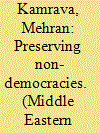| Srl | Item |
| 1 |
ID:
092337


|
|
|
|
|
| Publication |
2009.
|
| Summary/Abstract |
Consideration of the effects of domestic politics on international conflict behavior often consists simply of contrasting democracies with non-democracies. One notable exception is work that links economic performance and the use of force. This link has often been addressed through use of a diversionary perspective. In this paper, we argue that more important than the alleged incentive to pursue a rallying effect when times are bad are domestic political and economic factors affecting leaders' constraints, representing some of the costs to pursuing adventurous foreign policies. We examine three sources of constraints on democratic leaders: the willingness of the constituency to support the use of force internationally; the macroeconomic preferences of the party's constituency; and an interaction of those preferences with the state of the economy. We find that in developed democracies, the political orientation of the government is a significant factor affecting the likelihood of international conflict initiation. Specifically, right governments are more likely to initiate interstate disputes; economic conditions have a significant but lesser impact.
|
|
|
|
|
|
|
|
|
|
|
|
|
|
|
|
| 2 |
ID:
095486


|
|
|
|
|
| Publication |
2010.
|
| Summary/Abstract |
Authoritarian elites often prolong their tenure in office by engaging in wholesale institutional change. Whether inherited or created from scratch, state institutions in non-democracies are meant to solidify elite cohesion and political control, pacify potential opponents, and create coalitions that support the state. Nevertheless, autocrats keep a watchful eye on these institutions, and if they change internally in directions that may seem threatening to state leaders, the institutions are changed or even disbanded. Change to the institutions of the non-democratic state is caused by a combination of deliberate decisions and institutional crafting by state leaders on the one hand, and by institutional layering and changes initiated from within the institutions rhemselves on the other. As the cases of the National Assembly in Kuwait, the Revolutionary Command Council in Egypt, and the Revolutionary Council in Iran demonstrate, when and if state institutions become inefficient or are seen as a threat by authoritarian leaders, then state leaders once again take control in determining their shape and configuration. Non-democracies are often preserved through purposive institutional change.
|
|
|
|
|
|
|
|
|
|
|
|
|
|
|
|